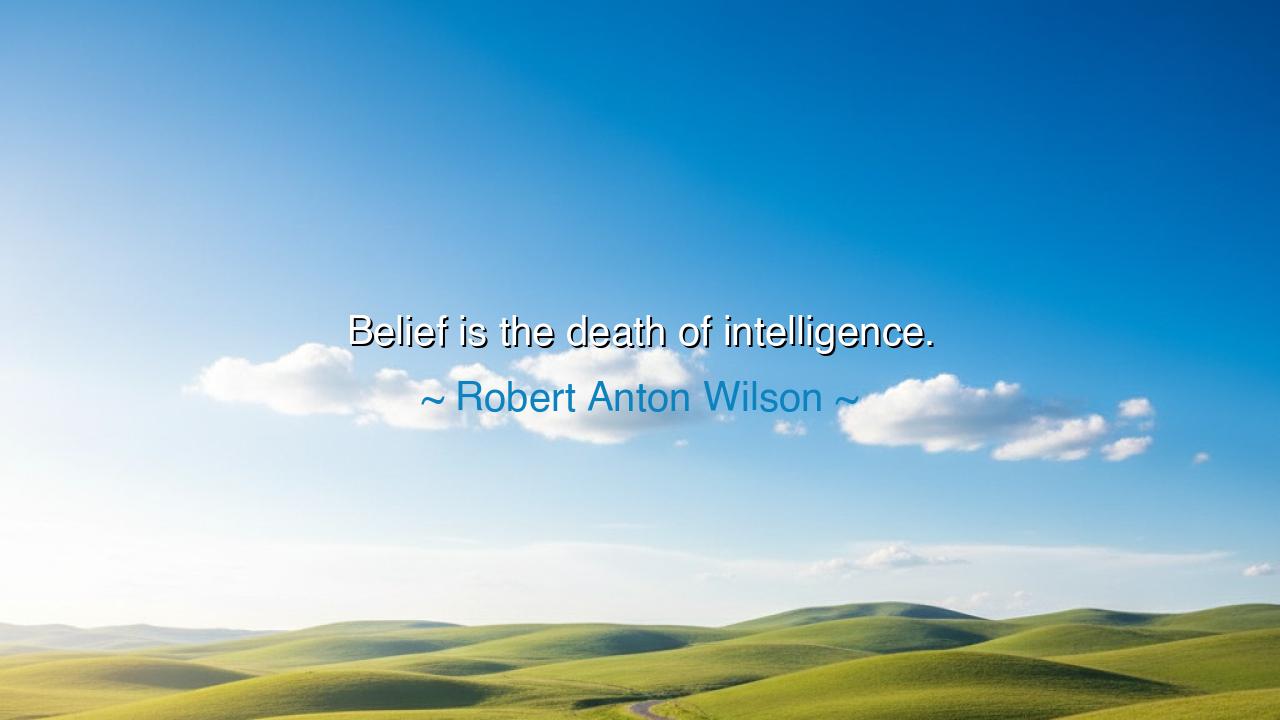
Belief is the death of intelligence.






“Belief is the death of intelligence.” Thus proclaimed Robert Anton Wilson, a thinker of fierce independence and boundless curiosity, who sought to awaken in humankind the spirit of perpetual questioning. His words, sharp as the blade of truth, strike against the comfort of certainty. In them lies an ancient warning—that when the mind clings too tightly to belief, it ceases to seek, to wonder, to grow. For intelligence is not a vessel filled with answers, but a flame fed by the winds of doubt and discovery. To believe absolutely is to close the door through which wisdom enters.
In the age of the ancients, wisdom was born not from rigid faith, but from inquiry. The philosophers of Greece did not build their glory upon conviction, but upon curiosity. Socrates, that humble midwife of truth, professed that his only knowledge was in knowing that he knew nothing. This was no confession of weakness, but the very foundation of intelligence. He understood that to stop questioning—to settle into belief—was to die while still breathing. His relentless questioning cost him his life, but it kept his mind eternally alive in the memory of all who came after. Thus Wilson’s words echo the same immortal principle: that the moment we cease to question, we surrender our most sacred human power.
Belief, in its purest form, is the desire for certainty—a hunger to rest upon solid ground. But life, ever shifting and infinite, offers no such permanence. The mind that insists upon final answers soon grows blind to new truths. History bears witness to this tragedy. When Galileo raised his telescope to the heavens and saw the moons of Jupiter, he beheld evidence that shattered old beliefs. Yet the guardians of doctrine, secure in their conviction that Earth was the center of all, condemned him for his vision. Their belief smothered their intelligence; their fear of uncertainty silenced their capacity to learn. In this, Wilson’s warning resounds: that belief, when held as absolute, becomes a tomb for thought.
And yet, let us not misunderstand him. Wilson did not condemn faith in its gentler sense—the trust that guides the heart through mystery. Rather, he spoke against the tyranny of rigid belief, which blinds the eye of reason and deafens the ear of compassion. The wise soul holds its ideas as one holds a bird: firm enough that it does not escape, yet gentle enough that it may still breathe. True intelligence is not the rejection of belief, but the refusal to let belief harden into dogma. It is the balance of heart and mind, where curiosity forever tempers conviction.
Consider also the lessons of science, that ever-evolving art of humility. Every great discovery is born not from belief, but from doubt—from the willingness to question even what seems sacred. When Newton’s laws seemed absolute, Einstein dared to ask if the universe might bend them. And when Einstein’s own theories dazzled the world, later minds rose to test and challenge him in turn. In this endless questioning lies the vitality of intelligence—a living flame passed from mind to mind, generation to generation. The moment it is declared final, it dies.
Wilson’s words also speak to the inner life of every person. How many hearts have closed themselves off to love, to understanding, to peace, because of unyielding beliefs—beliefs about others, about the world, about themselves? The one who says, “I already know,” can no longer learn. The one who says, “I am right,” can no longer grow. To live wisely, one must walk in the open air of uncertainty, willing to be humbled, willing to be changed. For it is in that trembling balance between knowing and not knowing that the light of intelligence shines most brightly.
So, my friends, learn from Wilson’s counsel: hold your beliefs lightly, but your curiosity fiercely. Let every sunrise remind you that knowledge is unfinished, that truth wears a thousand faces. When you hear a voice declare, “This is the way, and there is no other,” turn your heart toward questioning, not rebellion, but wonder. Practice humility in learning, courage in doubt, and compassion in discourse. For in this sacred dance between belief and inquiry, the human mind fulfills its highest purpose.
And remember—belief is the death of intelligence, but curiosity is its resurrection. Therefore, let your mind be a river, not a pond. Let it flow, question, reshape itself with every new discovery. For the wise do not cling to certainty—they dwell in the living mystery, and therein find the truest freedom of all.






AAdministratorAdministrator
Welcome, honored guests. Please leave a comment, we will respond soon